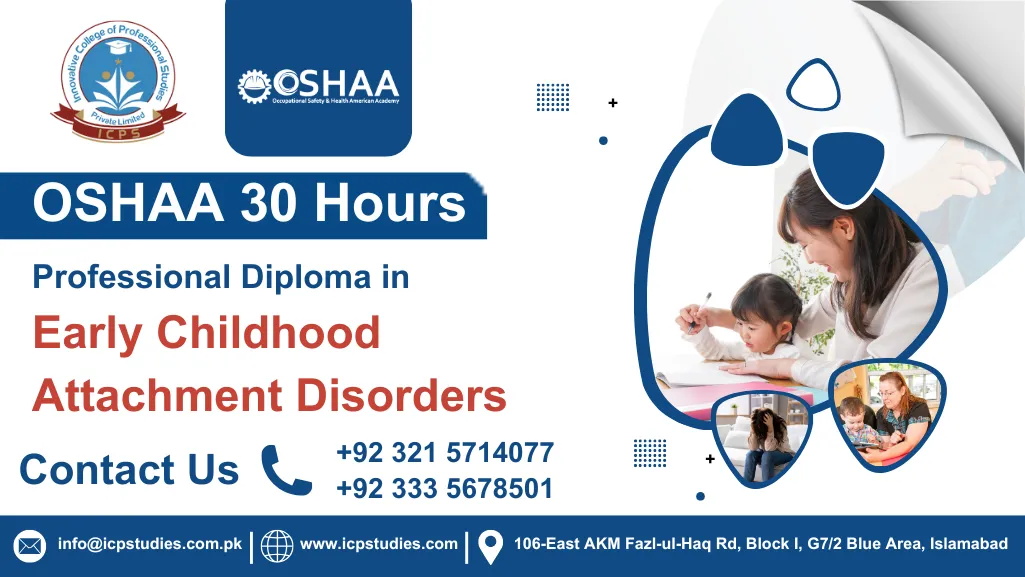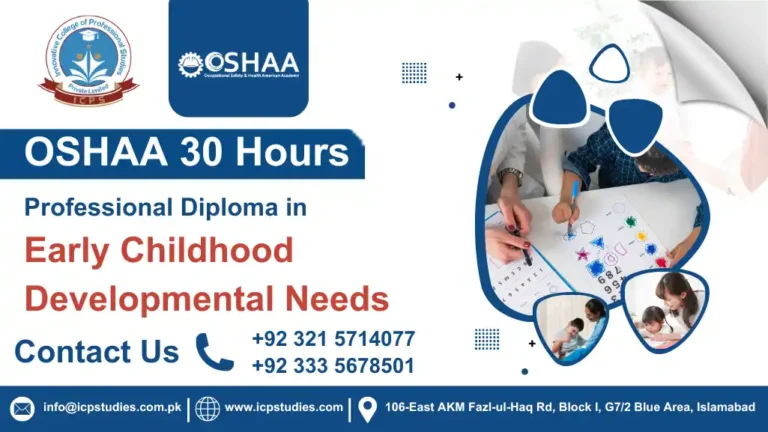Early childhood is a critical period for emotional and psychological development. During these formative years, the quality of attachment between a child and their caregivers plays a vital role in shaping future behaviour, emotional health, and social relationships. For professionals working with young children, understanding and addressing attachment disorders is essential. The OSHAA 30-Hours Professional Diploma in Early Childhood Attachment Disorders offers a specialised qualification designed to equip practitioners with the skills and knowledge to support children affected by attachment challenges.
Attachment disorders arise when children experience disruptions in their early bonds with primary caregivers. This may result from neglect, inconsistent care, trauma, or other adverse experiences. Children with attachment disorders often struggle with trust, emotional regulation, and forming healthy relationships. Without early intervention, these difficulties can persist into adulthood, impacting mental health and social functioning.
Early childhood attachment disorders require specialised knowledge and sensitive intervention to mitigate long-term impacts on children’s lives. The OSHAA 30-Hours Professional Diploma in Early Childhood Attachment Disorders provides an essential foundation for professionals dedicated to improving outcomes for vulnerable children. By enhancing expertise in this area, practitioners can make a meaningful difference, fostering healthier development and stronger futures for young children and their families.
All About OSHAA 30-Hours Professional Diploma in Early Childhood Attachment Disorders
Course Overview
The OSHAA 30-Hours Professional Diploma in Early Childhood Attachment Disorders offers a comprehensive and focused curriculum designed to deepen understanding of attachment theory and its practical application. This course equips professionals with the skills to identify, assess, and support young children experiencing attachment difficulties, ensuring timely and effective intervention. Through a blend of theoretical knowledge and practical strategies, learners gain insight into how attachment issues impact behaviour, learning, and emotional development.
Designed for early years practitioners, social workers, and healthcare professionals, the diploma covers key topics such as the causes of attachment disorders, assessment techniques, and evidence-based intervention methods. It also emphasises collaborative approaches involving families and multidisciplinary teams, promoting holistic care and positive outcomes for children. With flexible delivery and a total of 30 hours of study, this programme fits seamlessly into busy professional schedules while maintaining high academic standards.
Completing this accredited diploma not only enhances professional competence but also supports career advancement within early childhood care, education, and health sectors. The course is aligned with UK standards, making it a valuable qualification for those committed to supporting vulnerable children and fostering secure attachment relationships.
Study Units
- Introduction to Attachment Theory and Child Development (3 hours)
- Types of Attachment and Their Long-Term Impact (5 hours)
- Causes and Risk Factors of Attachment Disorders (3 hours)
- Recognizing Signs and Symptoms in Early Childhood (5 hours)
- Assessment and Diagnostic Approaches (3 hours)
- Therapeutic Models and Intervention Strategies (4 hours)
- Working with Families and Caregivers (3 hours)
- Attachment in Educational and Social Care Settings (4 hours)
Minimum Age:
Candidates must be at least 18 years old to enrol in this programme.
Educational Background:
A minimum of a Level 2 qualification (or equivalent) in early childhood education, health and social care, or a related field is recommended. However, applicants without formal qualifications but with relevant work experience may also be considered.
Work Experience:
Applicants should have practical experience working with young children, families, or within early years settings. This experience helps ensure learners can relate course content to real-world scenarios and apply knowledge effectively.
Language Proficiency:
Proficiency in English is essential, as all course materials and assessments are delivered in English. Candidates should possess a level of English that enables them to comprehend complex texts and communicate clearly, both verbally and in writing. Where necessary, evidence of English language proficiency (such as IELTS or equivalent) may be requested.
This diploma is specially designed for professionals working with young children and families who seek to enhance their understanding and skills in managing attachment disorders. It is ideal for:
- Early years educators and nursery staff
- Social workers specialising in children’s and family services
- Child psychologists, counsellors, and therapists
- Health visitors, community nurses, and paediatric practitioners
- Family support and outreach workers
- Professionals involved in safeguarding and child protection
- Students or practitioners aiming to specialise in early childhood development and mental health
This course suits anyone committed to improving outcomes for vulnerable children through evidence-based knowledge and practical strategies.
Learning Outcomes
Introduction to Attachment Theory and Child Development
- Understand the fundamental principles of attachment theory
- Explain key stages of child development related to attachment
- Recognise the role of early relationships in emotional and social growth
Types of Attachment and Their Long-Term Impact
- Identify different attachment styles and classifications
- Analyse how attachment patterns influence behaviour and relationships over time
- Assess the potential long-term effects of insecure or disorganised attachment
Causes and Risk Factors of Attachment Disorders
- Describe common causes and contributing factors of attachment disorders
- Understand environmental, psychological, and social risks affecting attachment
- Evaluate how trauma and neglect impact attachment formation
Recognising Signs and Symptoms in Early Childhood
- Identify behavioural and emotional indicators of attachment difficulties in young children
- Differentiate between attachment disorders and other developmental issues
- Develop observational skills for early detection of attachment concerns
Assessment and Diagnostic Approaches
- Explore various tools and methods used to assess attachment disorders
- Understand best practices for diagnosis and referral processes
- Apply appropriate assessment techniques in professional settings
Therapeutic Models and Intervention Strategies
- Gain knowledge of evidence-based therapeutic approaches for attachment disorders
- Develop practical skills in implementing intervention plans
- Understand how to tailor strategies to meet individual child needs
Working with Families and Caregivers
- Recognise the importance of family involvement in attachment repair
- Learn effective communication and support techniques for caregivers
- Promote collaboration between professionals and families
Attachment in Educational and Social Care Settings
- Understand the impact of attachment disorders within learning and care environments
- Apply attachment-informed approaches to behaviour management and support
- Develop strategies to create nurturing and inclusive educational settings
FAQs OSHAA 30-Hours Professional Diploma in Early Childhood Attachment Disorders







